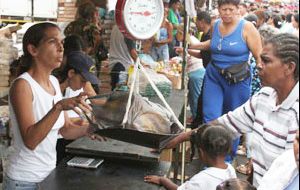MercoPress. South Atlantic News Agency
“God is Bolivarian” and will bring rain to Venezuela’s power stations, says Chavez
 Higher prices for some products of the Bolivarian food basket
Higher prices for some products of the Bolivarian food basket Venezuelan president Hugo Chavez faces a major power shortage that could severely damage the country’s economy and plunge his popularity, but he is confident sufficient rainfall is on the way to fill the lake of a crucial dam because “God is Bolivarian”.
The lack of rain is rapidly drying up Venezuelan hydroelectric plants, the country’s main source of electricity, and the national grid could collapse by May/June is the situation remains unchanged, according to the country’s energy advisors.
“The squalid (the name given by President Chavez to opponents) are praying for no rain. But you can bet it’s going to rain, pour with rain, because God is Bolivarian”, said the president during his weekly chats broadcasted on national radio and television.
“God is no opponent, God can’t be a squalid. Nature is with us” emphasized Chavez who likes to repeat that Jesus Christ was the “first Socialist” and he openly supports the “Bolivarian revolution” implemented by his administration.
El Guri hydroelectric plant which supplies the capital Caracas with 70% of power has reached a “critical level”, forcing controversial blackouts which have dumped more than one minister and power companies’ manager.
The first ill planned blackouts were confusing since it included hospitals and traffic lights turning the city into chaos, while the rotating cuts were not properly informed leaving hundreds trapped in elevators.
Chavez faces mid term elections next September (and presidential in 2012) and a collapse of the power system or reduced economic activity could be catastrophic for his political Bolivarian plans.
Meantime the government published in the Official Gazette a new list of “Bolivarian” prices for certain staples such as rice, sugar and chicken, to ensure “production profitability”.
Described as a “reasonable adjustment”, the kilo of chicken will now cost 11.31 Bolivar equivalent to 2.63 US dollars; rice 3.66 Bs (85 US cents) and sugar, 3.73 Bs (87 US cents).
Prices of these products as well as several others which make up the basic Bolivarian basket must be visible for consumers to see or tagged with the price.
“It is the responsibility of the Executive to promote and boost competition and production in the agriculture sector” and therefore a commercial policy is needed that ensures “reasonable adjustments to retain a balance in the sector”, said the official decree.
Meanwhile a local banker anticipated that the Venezuelan currency could fall as low as 9 per US dollar in the “worst scenario” as the government refrains from selling US currency in the unregulated market to preserve foreign reserves.
“In the worst scenario, the Bolivar could reach 9 per dollar,” Barclays economist Alejandro Grisanti said in an interview in Caracas. He forecasts the Bolivar will average 6.5 this year and 7.5 in 2011. “The government prefers to keep the parallel rate sustainable and 5 per dollar is not sustainable in time.”
President Chavez backed off comments last month that the government would strengthen the parallel rate to 4.3 this year, saying he planned to “defeat speculators” as part of a long-term strategy. The central bank has auctioned 310 million of dollar bonds in the local market this year, part of an effort to hold down inflation after Chavez devalued the official exchange rate by as much as 50% on January 8 as he struggled with dollar outflows and a growing budget deficit.
The Bolivar in the unregulated market stands at 6.85 paring a decline of 9.5% this year.
Venezuelan companies and individuals turn to the so-called parallel currency market when they can’t get government approval to buy dollars at the official rates of 2.6 and 4.3 Bolivar per dollar.
Venezuela’s foreign reserves have dropped 16% this year to 30 billion in March, the lowest since July, after the central bank transferred 4 billion to an off-budget development fund. The central bank is seeking to keep reserves above the 28 billion US dollars level its board of directors deems “adequate”.




Top Comments
Disclaimer & comment rulesCommenting for this story is now closed.
If you have a Facebook account, become a fan and comment on our Facebook Page!